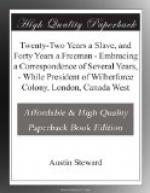On the nineteenth day of January, 1837, I left Wilberforce, passing through Brantford, Hamilton, Queenston, Lewiston, and from thence to Rochester. During my journey, I could not avoid feeling sad and despondent, as my mind incessantly returned to the review of my mission, upon which I could look with no other decision than that of an entire failure. I had spent my time, wasted my substance for naught, and was now returning to my dependant family,—that, with myself, had been stripped of nearly every means of comfort and support.
What would my Rochester friends think of my conduct? Notwithstanding all my despondency and evil foreboding at that time, I am now well satisfied that my labor was not all in vain, but that some good did result from it.
As I drew near the city, a gloom like thick darkness overshadowed me: I thought of the unfavorable transactions which had occurred between the directors of the colony and my friends in Rochester, and fell to wondering how they would receive me.
On the twenty-third of January, 1837, I finally re-entered the city penniless; but as I soon found, not so friendless as my fears would have it. Among, the first to welcome me back to my old home, was that friend of “blessed memory,” Everard Peck, who had been apprised of some of the losses I had met and the trials I had passed through. This gentleman was also one of the first to propose to be one of five men, who should loan me one hundred dollars each, for five years. Through the disinterested kindness of this worthy gentleman, I was in a few days after my arrival, well established in a store of provisions and groceries. The five kind gentlemen, to whom I was so deeply indebted for the loan, were: Everard Peck, George A. Avery, Samuel D. Porter, Levi W. Sibley, and Griffith, Brother & Co.
This noble act of generosity and kindness, on the part of my friends, to furnish me with the means to commence business, especially when their prospect was anything but flattering, regarding my ever being able to refund their well-timed and gracious liberality,—affected me more deeply than all the censure and persecution I had elsewhere received. Their frown and displeasure, I was better prepared to meet than this considerate act of Christian sympathy, which I am not ashamed to say melted me to tears, and I resolved to show my appreciation of their kindness by an industry and diligence in business hitherto unsurpassed.




